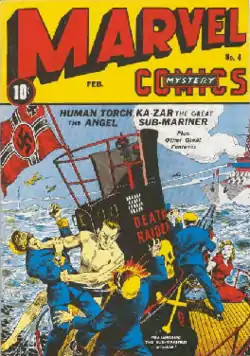Marvel Mystery Comics
Marvel Mystery Comics (first issue titled simply Marvel Comics) is an American comic book series published during the 1930s–1940s period known to fans and historians as the Golden Age of Comic Books. It was the first publication of Marvel Comics' predecessor, Timely Comics, a division of Timely Publications.
| Marvel Mystery Comics | |
|---|---|
 First cover appearance, the Sub-Mariner: Marvel Mystery Comics #4 (Feb. 1940). Art by Alex Schomburg. | |
| Publication information | |
| Publisher | Timely Comics |
| Format | Ongoing series |
| Publication date | October 1939 – August 1957 |
| No. of issues | 159 |
Publication history
Premiere issue: Marvel Comics #1
In 1939, pulp-magazine publisher Martin Goodman expanded into the newly emerging comic book field by buying content from comics packager Funnies, Inc.
On August 31, 1939, his first effort, Marvel Comics #1 (cover-dated Oct. 1939), from his company Timely Publications, was published.[1] This featured the first appearances of writer-artist Carl Burgos' android superhero, the Human Torch, Paul Gustavson's costumed detective the Angel, and the first generally available appearance of Bill Everett's mutant anti-hero Namor the Sub-Mariner. [2] The Sub-Mariner was created for the unpublished movie-theater giveaway comic Motion Picture Funnies Weekly earlier that year, with the eight-page original story now expanded by four pages. Also included were Al Anders' Western hero the Masked Raider; the jungle lord Ka-Zar the Great, with Ben Thompson beginning a five-issue adaptation of the story "King of Fang and Claw" by Bob Byrd in Goodman's pulp magazine Ka-Zar #1 (Oct. 1936);[3] the non-continuing-character story "Jungle Terror," featuring an adventurer named Ken Masters, written by the quirkily named Tohm Dixon;[4] "Now I'll Tell One", five single-panel, black-and-white gag cartoons by Fred Schwab, on the inside front cover; and a two-page prose story by Ray Gill, "Burning Rubber", about auto racing.[2] A painted cover by veteran science fiction pulp artist Frank R. Paul featured the Human Torch,[2] looking much different than in the interior story.
That initial comic quickly sold out 80,000 copies, prompting Goodman to produce a second printing, cover-dated November 1939 and identical except for a black bar in the inside-front-cover indicia over the October date, and the November date added at the end. That sold approximately 800,000 copies.[5] With a hit on his hands, Goodman began assembling an in-house staff, hiring Funnies, Inc. writer-artist Joe Simon as editor. Simon brought along his collaborator, artist Jack Kirby, followed by artist Syd Shores.
As Marvel Mystery Comics
The Human Torch and the Sub-Mariner would continue to star in the long-running title even after receiving their own solo comic-book series shortly afterward. The Angel, who was featured on the covers of issues #2–3, would appear in every issue through #79 (Dec. 1946).[6]
Other characters introduced in the title include the aviator the American Ace (#2, Dec. 1939), with part one of his origin reprinted, like the first part of the Sub-Mariner's, from Motion Picture Funnies Weekly #1; the private detective the Ferret; and writer-artist Steve Dahlman's robot hero Electro (appearing in every issue from #4–19, Feb. 1940 – May 1941). Issue #13 saw the first appearance of the Vision, the inspiration for the same-name Marvel Comics superhero created in 1968. The original Vision appeared in solo stories through Marvel Mystery Comics #48.[6]
As Marvel Tales
In 1949, with the popularity of superheroes having waned, the book was converted into the horror anthology Marvel Tales from issue #93–159 (Aug. 1949 – Aug. 1957), when it ceased publication.[7] Marvel published a different series of the same name in the 1960s, primarily reprinting Spider-Man stories.
Reprints
- Marvel Comics #1: 70th Anniversary Edition (reprints #1 with modern coloring, 2009)
- Golden Age Marvel Comics Omnibus (Marvel Comics #1; Marvel Mystery Comics #2–12)
- Marvel Masterworks: Golden Age Marvel Comics Vol. 1 (Marvel Comics #1, Marvel Mystery Comics #2–4)
- Marvel Masterworks: Golden Age Marvel Comics Vol. 2 (Marvel Mystery Comics #5–8)
- Marvel Masterworks: Golden Age Marvel Comics Vol. 3 (Marvel Mystery Comics #9–12)
- Marvel Masterworks: Golden Age Marvel Comics Vol. 4 (Marvel Mystery Comics #13–16)
- Marvel Masterworks: Golden Age Marvel Comics Vol. 5 (Marvel Mystery Comics #17–20)
- Marvel Masterworks: Golden Age Marvel Comics Vol. 6 (Marvel Mystery Comics #21–24)
- Marvel Masterworks: Golden Age Marvel Comics Vol. 7 (Marvel Mystery Comics #25-28)
See also
References
- "Marvel Comics (1939) #1". Marvel.com. Marvel Comics. Retrieved September 26, 2020.
- Marvel Comics #1 at the Grand Comics Database
- Ka-Zar at Don Markstein's Toonopedia. Archived from the original on April 21, 2011. The Ka-Zar here, who would appear in every issue through Marvel Mystery Comics #27 (Jan. 1942) is unrelated to the Marvel Comics jungle lord Ka-Zar introduced in The X-Men #10 (March 1965).
- Marvel Masterworks: Golden Age Marvel Comics Volume 1 (Marvel, 2004) ISBN 0-7851-1609-5, as given in the contents page and as signed on the first page of the story, reprinted on pp. 46–51
- Per researcher Keif Fromm, Alter Ego #49, p. 4 (caption)
- Marvel Mystery Comics at the Grand Comics Database
- Marvel Tales (Marvel, 1949 Series) at the Grand Comics Database